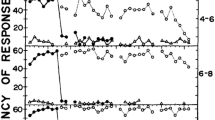Abstract
A problem is a difference between what a person has and wants. A solution is anything that reduces the difference. These two simple definitions form the foundation of an ecological perspective on the often-complex, reciprocal relationships among people, their environments and their behaviours—a perspective that mixes causal ideas from psychology with consequential ideas from economics. The present article offers a brief introduction to this perspective and suggests how it might be instantiated by naturalistic observations and content analyses of narratives.
Similar content being viewed by others
References
Bales RF (1950) Interaction process analysis; a method for the study of small groups. Addison-Wesley Press, Cambridge
Bandura A (1989) Human agency in social cognitive theory. Am Psychol 44:1175–1184
Barker RG (1968) Ecological psychology: concepts and methods for studying the environment of human behavior. Stanford University Press, Stanford
Bronfenbrenner U (1979) The ecology of human development: experiments by nature and design. Harvard University Press, Cambridge
Bruner J, Goodnow J, Austin G (1956) A study of thinking. Chapman & Hall, New York
Brunswik, E. (1954). The conceptual framework of psychology. International Encyclopedia of Unified Science, 1(10), Chicago, University of Chicago Press.
Campbell J (1949) Hero with a thousand faces. Pantheon Books, New York
Dillon J (1982) In pursuit of the colon: a century of scholarly progress. J High Educ 53(1):93–99
Frank R, Cook P (1996) The winner-take-all-society. Penguin Books, New York
Gibson J (1966) The senses considered as perceptual systems. Hughton Mifflin, Boston
Gillie T, Broadbent D (1989) What makes interruptions disruptive? A study of length, similarity, and complexity. Psychol Res 50(4):243–250
Hardin G (1959) Nature and man’s fate. Rinehart, New York
Kelley H, Holmes J, Kerr N, Reis H, Rusbult C, van Lange P (2003) An Atlas of interpersonal situations. Cambridge University Press, Cambridge
Levins R (1966) The strategy of model building in population biology. Am Sci 54(4):421–431
Lewin K (1936) Principles of Topological Psychology. McGraw-Hill, New York
Maynard Smith, J. (1982) Evolution and the Theory of Games. Cambridge University Press.
Merton R (1936) The unanticipated consequences of purposive social action. Am Sociol Rev 1(6):894–204
Mischel W (1973) Toward a cognitive social learning reconceptualization of personality. Psychol Rev 80:252–283
Newell A, Simon H (1980) Human problem solving. Prentice-Hall, Englewood Cliffs
Powers W (1978) Quantitative analysts of purposive systems: some spadework at the foundations of scientific psychology. Psychol Rev 85(5):417–435
Powers W (1989) Living control systems. Benchmark Publications, Bloomfield
Schelling T (2006) Micromotives and macrobehavior. Norton, New York
Simon H (1956) Rational choice and the structure of the environment. Psychol Rev 63(2):129–138
Slobodkin, L., & Rapoport, A. (1974). An optimal strategy of evolution. Quarterly Review of Biology, 49)3), 181–200.
Thorngate W (1988) On the evolution of adjudicated contests and the principle of invidious selection. J Behav Decis Mak 1(1):5–16
Thorngate W, Hotta M (1995) Life and luck: survival of the fattest. Simul Gaming 26(1):5–16
Thorngate W, Tavakoli M (2005) In the long run: biological versus economic rationality. Simul Gaming 36(1):9–26
Thorngate W, Dawes R, Foddy M (2009) Judging merit. Psychology Press, New York
Todd P, Gigerenzer G (2012) Ecological rationality: intelligence in the world. UK Oxford Scholarship Online, Oxford
Funding
None.
Author information
Authors and Affiliations
Corresponding author
Ethics declarations
Conflict of interest
Not applicable.
Additional information
Publisher's Note
Springer Nature remains neutral with regard to jurisdictional claims in published maps and institutional affiliations.
Rights and permissions
About this article
Cite this article
Thorngate, W. Problems and solutions: an ecological view. Mind Soc 19, 91–102 (2020). https://doi.org/10.1007/s11299-020-00227-3
Received:
Accepted:
Published:
Issue Date:
DOI: https://doi.org/10.1007/s11299-020-00227-3




